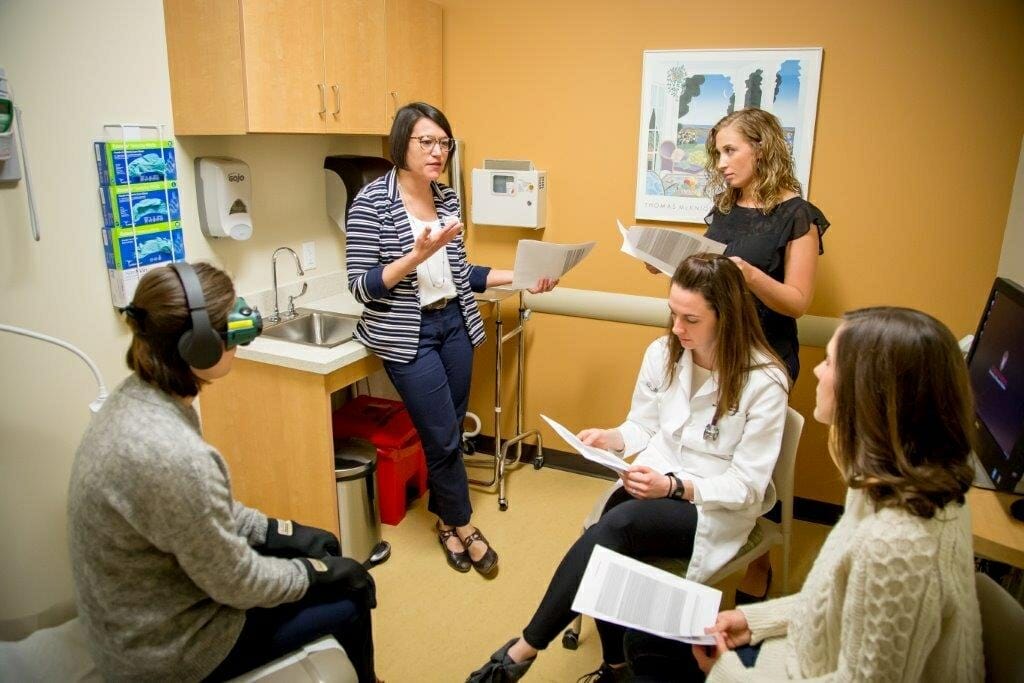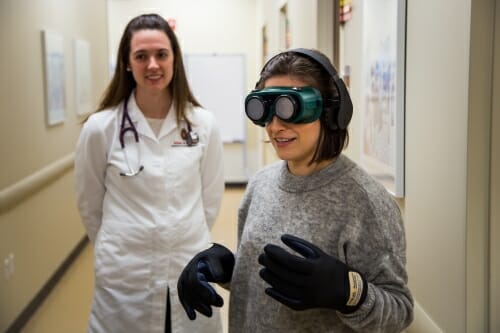New toolkit guides professionals, others in scenarios involving dementia

Sarah Endicott, clinical assistant professor and geriatric nurse practitioner, discussing a dementia simulation with DNP students. Photo by Alexander Andre
Charlie is holding up the line at the pharmacist. He has a prescription bottle in his hand and a confused look on his face. He insists that he needs a refill.
“You are not due for a refill on your metoprolol,” the pharmacist says. “I refilled this medication for you Tuesday. Remember?”
Charlie does not.
Customers like Charlie show up at pharmacy counters, banks, and retailers throughout Wisconsin every day. That is why this scene is the beginning of one of six scenarios in the “Dementia Friendly Toolkit: Role Play Simulations for Care and Community Settings” from the Center for Aging Research and Education (CARE) at the University of Wisconsin–Madison School of Nursing. CARE has distributed toolkits throughout the state, and now 52 of Wisconsin’s 72 counties now have a business or organization using the toolkit to better serve individuals with dementia and their families. The toolkit is available on the CARE website.
“I am very proud of how quickly the toolkits have gotten out into communities,” says Barb King, an associate professor in the School of Nursing and CARE director. “We are in 52 counties. That kind of distribution in less than a year shows the huge demand and the desire people have to make clinics, businesses and agencies more supportive of people living with dementia.”

A student wearing simulation equipment to better understand what a clinic visit is like for patients with dementia. Photo by Alexander Andre
The Wisconsin Department of Health Services estimates that, as of 2019, there are 121,000 individuals in the state living with dementia. By 2040 that number is expected to more than double as the number of state residents aged 65 or older increases by 72 percent.
“Making communities more dementia-friendly is already important,” King says, “and it is going to become increasingly critical for all sectors to support family caregivers and their loved ones who are living with dementia.”
The CARE toolkit offers several scenarios designed to prepare professionals, like pharmacists, as well as family members and other front-line staff, to handle situations like Charlie’s. In this case, a pharmacist familiar with dementia might give Charlie enough medication to last a few days, perhaps also contact a family member associated with Charlie’s account, and immediately relay the interaction to the prescribing doctor so Charlie’s healthcare team could address the issue with Charlie and his caregivers.
CARE developed the toolkit after compiling numerous stories of challenging medical appointments and receiving specific requests from community organizations for training materials.
“The project started by listening to the needs of people most affected by dementia,” says Sarah Endicott, a geriatric nurse practitioner and clinical associate professor at the School of Nursing. Endicott, along with Lisa Bratzke, assistant professor, Paula Woywod, clinical instructor, and Diane Farsetta, CARE outreach specialist, combined their practice and research expertise with the input from families dealing with dementia to create scripts for the six simulations.
The team trialed the simulations, first with School of Nursing students, then with UW–Madison students from other health sciences and allied disciplines, and finally with community members. They refined the simulations with feedback from each group, which they also used to shape the rest of the toolkit, including facilitator and discussion guides, setting and equipment suggestions, additional information about each scenario, and links to community resources.
“The most profound moment for me,” Endicott says, “was when a student noted that applying the communication techniques did not take any more time than rushing through a clinic visit with a set agenda.”
The simulation trials that Bratzke most remembers involved community members who work with older adults living with dementia.
“They were moved by the simulations and felt the isolation, fear, frustration, and confusion that is so common among individuals with dementia and their family members,” Bratzke says. “That was when I really felt like we were getting this right.”
The other scenarios are set in other commonly frequented locations and situations: a bank, clinic, restaurant, grocery store, and telephone conversation. The team wanted a diverse group of settings and interactions to make the simulations useful for a broad range of organizations and businesses. Dementia-friendly community groups can include the videos and simulations in trainings. Healthcare organizations can use them for staff professional development. Health sciences instructors can use them as active learning exercises. Advocacy groups can use them in workshops for family caregivers.
“As a nurse, I’m more familiar working with … acute care settings,” Woywod says, “but there’s so much we can do to support individuals living with dementia beyond traditional healthcare settings.”
Joy Schmidt is a social worker and the dementia care specialist for the Dane County Aging and Disability Resource Center. She is a featured expert in one of the training videos, and she provided feedback to the team on the simulations and toolkit. Now that the materials are available, Schmidt is eager to use them in her work.
Schmidt trains community groups and organizations on dementia friendly practices, and she frequently gets questions that are covered in the scenarios. The phone call from a confused patron is one that comes up regularly. “I think it is really neat that they are taking specific situations from community members and covering how you might handle those,” she says. “What I appreciate most about Diane and Lisa is that they really are thoughtfully seeking what the community needs and not creating something just because they think it’s a good idea. I’ve never worked on such a cool project.”
The toolkit and training videos, which are available on the CARE website, were developed with support from the Ira and Ineva Reilly Baldwin Wisconsin Idea Endowment and the Helen Daniels Bader Fund of Bader Philanthropies. The Evjue Foundation will support dissemination of the toolkit to community groups.
Tags: aging, outreach, School of Nursing, uw changes lives
